An order-preserving dictionary of variants. More...
#include <variant_object.hpp>
Public Types | |
| typedef variant_object::entry | entry |
| a key/value pair | |
| typedef std::vector< entry >::iterator | iterator |
| typedef std::vector< entry >::const_iterator | const_iterator |
Friends | |
| class | variant_object |
Detailed Description
Keys are kept in the order they are inserted. This dictionary implements copy-on-write
- Note
- This class is not optimized for random-access on large sets of key-value pairs.
Definition at line 117 of file variant_object.hpp.
Member Typedef Documentation
◆ const_iterator
| std::vector<entry>::const_iterator fc::mutable_variant_object::const_iterator |
Definition at line 124 of file variant_object.hpp.
◆ entry
Definition at line 121 of file variant_object.hpp.
◆ iterator
| std::vector<entry>::iterator fc::mutable_variant_object::iterator |
Definition at line 123 of file variant_object.hpp.
Constructor & Destructor Documentation
◆ mutable_variant_object() [1/7]
|
inlineexplicit |
Definition at line 212 of file variant_object.hpp.

◆ mutable_variant_object() [2/7]
| fc::mutable_variant_object::mutable_variant_object | ( | ) |
Definition at line 273 of file variant_object.cpp.
◆ mutable_variant_object() [3/7]
initializes the first key/value pair in the object
Definition at line 278 of file variant_object.cpp.
◆ mutable_variant_object() [4/7]
|
inline |
Definition at line 223 of file variant_object.hpp.
◆ mutable_variant_object() [5/7]
| fc::mutable_variant_object::mutable_variant_object | ( | mutable_variant_object && | obj | ) |
Definition at line 294 of file variant_object.cpp.
◆ mutable_variant_object() [6/7]
| fc::mutable_variant_object::mutable_variant_object | ( | const mutable_variant_object & | obj | ) |
Definition at line 289 of file variant_object.cpp.
◆ mutable_variant_object() [7/7]
| fc::mutable_variant_object::mutable_variant_object | ( | const variant_object & | obj | ) |
Definition at line 284 of file variant_object.cpp.
Member Function Documentation
◆ begin() [1/2]
| mutable_variant_object::iterator fc::mutable_variant_object::begin | ( | ) |
Definition at line 190 of file variant_object.cpp.
◆ begin() [2/2]
| mutable_variant_object::iterator fc::mutable_variant_object::begin | ( | ) | const |
Definition at line 200 of file variant_object.cpp.
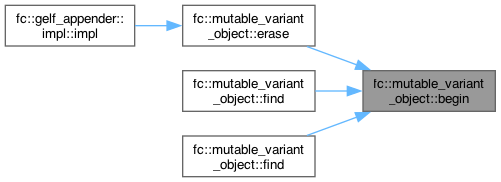
◆ end() [1/2]
| mutable_variant_object::iterator fc::mutable_variant_object::end | ( | ) |
Definition at line 195 of file variant_object.cpp.
◆ end() [2/2]
| mutable_variant_object::iterator fc::mutable_variant_object::end | ( | ) | const |
Definition at line 205 of file variant_object.cpp.
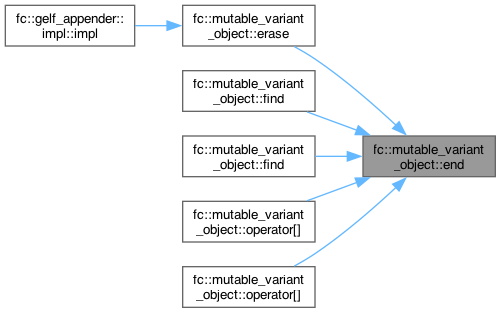
◆ erase()
| void fc::mutable_variant_object::erase | ( | const string & | key | ) |
Definition at line 328 of file variant_object.cpp.
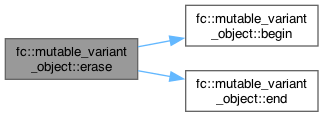

◆ find() [1/4]
| mutable_variant_object::iterator fc::mutable_variant_object::find | ( | const char * | key | ) |
Definition at line 232 of file variant_object.cpp.
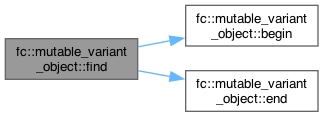
◆ find() [2/4]
| mutable_variant_object::iterator fc::mutable_variant_object::find | ( | const char * | key | ) | const |
Definition at line 215 of file variant_object.cpp.
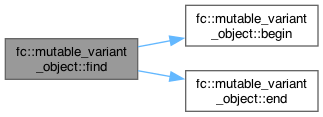
◆ find() [3/4]
| mutable_variant_object::iterator fc::mutable_variant_object::find | ( | const string & | key | ) |
- Returns
- end() if key is not found
Definition at line 227 of file variant_object.cpp.

◆ find() [4/4]
| mutable_variant_object::iterator fc::mutable_variant_object::find | ( | const string & | key | ) | const |
Definition at line 210 of file variant_object.cpp.

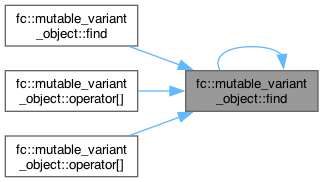
◆ operator()() [1/8]
| mutable_variant_object & fc::mutable_variant_object::operator() | ( | const mutable_variant_object & | mvo | ) | & |
Copy another mutable_variant_object into this mutable_variant_object.
Definition at line 398 of file variant_object.cpp.
◆ operator()() [2/8]
| mutable_variant_object fc::mutable_variant_object::operator() | ( | const mutable_variant_object & | mvo | ) | && |
Definition at line 407 of file variant_object.cpp.
◆ operator()() [3/8]
| mutable_variant_object & fc::mutable_variant_object::operator() | ( | const variant_object & | vo | ) | & |
Copy a variant_object into this mutable_variant_object.
Definition at line 384 of file variant_object.cpp.
◆ operator()() [4/8]
| mutable_variant_object fc::mutable_variant_object::operator() | ( | const variant_object & | vo | ) | && |
Definition at line 391 of file variant_object.cpp.
◆ operator()() [5/8]
|
inline |
Definition at line 185 of file variant_object.hpp.
◆ operator()() [6/8]
|
inline |
Definition at line 191 of file variant_object.hpp.
◆ operator()() [7/8]
| mutable_variant_object & fc::mutable_variant_object::operator() | ( | string | key, |
| variant | var ) & |
Appends key and var without checking for duplicates, designed to simplify construction of dictionaries using (key,val)(key2,val2) syntax Convenience method to simplify the manual construction of variant_objects
Instead of: mutable_variant_object("c",c).set("a",a).set("b",b);
You can use: mutable_variant_object( "c", c )( "b", b)( "c",c )
- Returns
- *this;
Appends key and var without checking for duplicates, designed to simplify construction of dictionaries using (key,val)(key2,val2) syntax
Definition at line 372 of file variant_object.cpp.
◆ operator()() [8/8]
| mutable_variant_object fc::mutable_variant_object::operator() | ( | string | key, |
| variant | var ) && |
Definition at line 378 of file variant_object.cpp.
◆ operator=() [1/3]
| mutable_variant_object & fc::mutable_variant_object::operator= | ( | const mutable_variant_object & | obj | ) |
Definition at line 314 of file variant_object.cpp.
◆ operator=() [2/3]
| mutable_variant_object & fc::mutable_variant_object::operator= | ( | const variant_object & | obj | ) |
Definition at line 299 of file variant_object.cpp.
◆ operator=() [3/3]
| mutable_variant_object & fc::mutable_variant_object::operator= | ( | mutable_variant_object && | obj | ) |
Definition at line 305 of file variant_object.cpp.
◆ operator[]() [1/4]
| variant & fc::mutable_variant_object::operator[] | ( | const char * | key | ) |
Definition at line 260 of file variant_object.cpp.
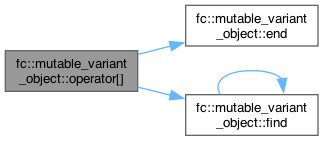
◆ operator[]() [2/4]
| const variant & fc::mutable_variant_object::operator[] | ( | const char * | key | ) | const |
Definition at line 249 of file variant_object.cpp.
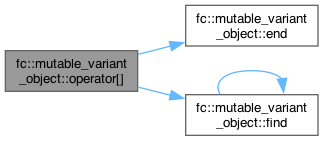
◆ operator[]() [3/4]
Definition at line 255 of file variant_object.cpp.
◆ operator[]() [4/4]
Definition at line 244 of file variant_object.cpp.
◆ reserve()
| void fc::mutable_variant_object::reserve | ( | size_t | s | ) |
◆ set() [1/2]
| mutable_variant_object & fc::mutable_variant_object::set | ( | string | key, |
| variant | var ) & |
replaces the value at key with var or inserts key if not found
replaces the value at key with var or insert's key if not found
Definition at line 341 of file variant_object.cpp.

◆ set() [2/2]
| mutable_variant_object fc::mutable_variant_object::set | ( | string | key, |
| variant | var ) && |
Definition at line 355 of file variant_object.cpp.
◆ size()
| size_t fc::mutable_variant_object::size | ( | ) | const |
Definition at line 268 of file variant_object.cpp.

Friends And Related Symbol Documentation
◆ variant_object
|
friend |
Definition at line 238 of file variant_object.hpp.
The documentation for this class was generated from the following files:
- libraries/fc/include/fc/variant_object.hpp
- libraries/fc/src/variant_object.cpp
